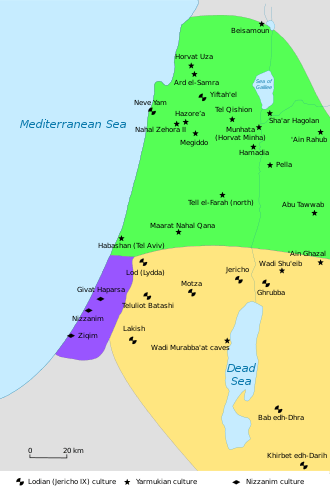Nizzanim culture
The Nizzanim culture is a disputed archaeological culture from the Pottery Neolithic of the Southern Levant. It was identified in three sites in the southern coastal plain of modern Israel including the type site Nizzanim, Giv‘at Haparsa and Hof Zikim which were studied by Ya'akov Olami, Felix Burian, Erich Friedman, Shmuel Yeivin and Yosef Garfinkel. In those sites there were no architectural remains but pits and floor levels with hearths. These findings seem to represent a pastoral-nomadic population, similar to the precedeeing population of Pre-Pottery Neolithic Ashkelon and the Qatifian culture.[1] Garfinkel suggests that these settlement served as seasonal hunting or fishing campsites.[2]

The dating of the Nizzanim culture is unclear mainly because no stratigraphic relations with different periods have been observed. While Garfinkel proposes that it coexisted with the Yarmukian and Lodian culture, Avi Gopher and Ram Gophna do not accept the three sites as a distinct culture and consider it to be a variant of the Lodian culture. Only one proper radiocarbon date is available (5767–5541 BCE) but dates one of the sites to the time of the Wadi Raba culture (post-dating the Yarmukian and Lodian), but this is contradicted by the findings and most archaeologists agree this site should be dated to the Pottery Neolithic (c. 6400 - 5800 BCE).[2]
Artifacts
The pottery of the Nizzanim culture is characterized by simple designs, executed roughly and with very little decorations. This type of pottery is considered very simple in compare to other Neolithic pottery assemblages, including those of the nearby Yarmukian and Lodian cultures. flint tools and animal bones. The Nizzanim pottery includes a few basic shapes, typically undecorated.[2]
The flint tool types are similar to the types of the preceding Pre-Pottery Neolithic tools with a large number of arrowheads, sickle blades and hole punchers, while to that of earlier pre-Pottery Neolithic C sites and feature a relative abundance of arrowheads, sickle blades (Yarmukian and Lodian types) and perforators, while hand axes are relatively scarce.[1]
References
- Yosef Garfinkel (2019). "Sha'ar Hagolan Volume 5, Early Pyrotechnology: Ceramics and White Ware". Qedem Reports. Institute of Archaeology, Hebrew University of Jerusalem. 14: 12. JSTOR 26747746.
- Katharina Streit (2017). "Transregional Interactions Between Egypt and the Southern Levant in The 6th Millennium calBC". Egypt and the Levant. 27: 415–416. JSTOR 26524910.